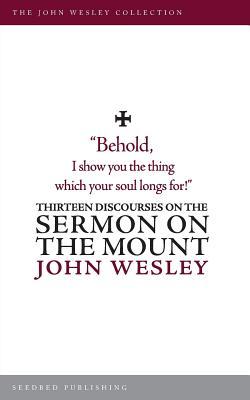- Bible
- Read the Bible
- Bible Versions
- Verse of the Day
- Reading Plans
- Verses by Topic
- Books of the Bible
- Bible Images
- Study
- Commentaries
- Concordances
- Dictionaries
- Encyclopedias
- Sermons
- Bible Atlas & Maps
- BP Wiki
- Devotionals
- Today's Devotionals
- Light of the World
- All Devotionals
- Inspirational Quotes
- More
- Picture Quotes
- Videos
- Inspirational
- Bible Study
- What The Bible Says
- Bible Q&As
- Daily Bread
- Bible by Genre
- Bible Stories
- Random Bible Verse
- Community
- Store
Thirteen Discourses on the Sermon on the Mount
by John Wesley
John Wesley's thirteen discourses on Jesus's Sermon on the Mount were first published in 1746 in a collection called Sermons on Several OccasionsSermons on Several Occasions. To this day considered one of the greatest interpreters of the Sermon on the Mount, Wesley approaches the text with the dual understanding of Old Testament law and New Testament gospel that he believed should characterize Christian preaching.
Thirteen Discourses on the Sermon on the MountThirteen Discourses on the Sermon on the Mount confronts readers with Wesley's understanding of Jesus's vibrant message: true holiness in Christ, distinguished from merely external religion. Wesley points to Kingdom living in its fullness as he describes the character that Christ Himself embodies and offers to freely share with those who follow Him.
The writings represented in The John Wesley Collection resourced the early Methodists in their quest to spread the gospel. In each of his works, John Wesley was vitally driven by the practical reality of the inner witness and outer working of the Holy Spirit. The relevance of these writings continues to the present day. It is our prayer that this collection would once again resource a great global awakening to the gospel, fomenting a revolution of Holy Love.
Thirteen Discourses on the Sermon on the MountThirteen Discourses on the Sermon on the Mount confronts readers with Wesley's understanding of Jesus's vibrant message: true holiness in Christ, distinguished from merely external religion. Wesley points to Kingdom living in its fullness as he describes the character that Christ Himself embodies and offers to freely share with those who follow Him.
The writings represented in The John Wesley Collection resourced the early Methodists in their quest to spread the gospel. In each of his works, John Wesley was vitally driven by the practical reality of the inner witness and outer working of the Holy Spirit. The relevance of these writings continues to the present day. It is our prayer that this collection would once again resource a great global awakening to the gospel, fomenting a revolution of Holy Love.
Paperback, 280 pages
Published April 3rd 2014 by Seedbed Publishing (first published March 21st 2014)
© 2025 Bibleportal.com All rights reserved.

John Wesley (1703 - 1791)
Was an Anglican cleric and Christian theologian. Wesley is largely credited, along with his brother Charles Wesley, as founding the Methodist movement which began when he took to open-air preaching in a similar manner to George Whitefield. In contrast to Whitefield's Calvinism, Wesley embraced the Arminian doctrines that were dominant in the 18th-century Church of England. Methodism in both forms became a highly successful evangelical movement in Britain, which encouraged people to experience Jesus Christ personally.Wesley helped to organise and form societies of Christians throughout Great Britain, North America and Ireland as small groups that developed intensive, personal accountability, discipleship and religious instruction among members. His great contribution was to appoint itinerant, unordained preachers who travelled widely to evangelise and care for people in the societies. Under Wesley's direction, Methodists became leaders in many social issues of the day, including the prison reform and abolitionism movements.
John Wesley was an Anglican cleric and Christian theologian. Wesley is largely credited, along with his brother Charles Wesley, with founding the Methodist movement which began when he took to open-air preaching in a similar manner to George Whitefield. In contrast to George Whitefield's Calvinism (which later led to the forming of the Calvinistic Methodists), Wesley embraced Arminianism. Methodism in both forms was a highly successful evangelical movement in the United Kingdom, which encouraged people to experience Christ personally.
Wesley believed that this doctrine should be constantly preached, especially among the people called Methodists. In fact, he contended that the purpose of the Methodist movement was to "spread scriptural holiness across England."
Throughout his life, Wesley remained within the Church of England and insisted that his movement was well within the bounds of the Anglican tradition. His maverick use of church policy put him at odds with many within the Church of England, though toward the end of his life he was widely respected.
John Wesley was the founder of the Methodist movement which grew from the 'Holy Club' of his Oxford friends into a great religious revival. An indefatigable traveller, preacher and writer, Wesley averaged 8,000 miles a year on horseback and gave 15 sermons a week. The reluctance of the Anglican clergy to lend him their pulpits led him to give some of his sermons in the open air, a decision which enabled him to reach those among the poorer sections of society who were not accustomed to going to church.
... Show more